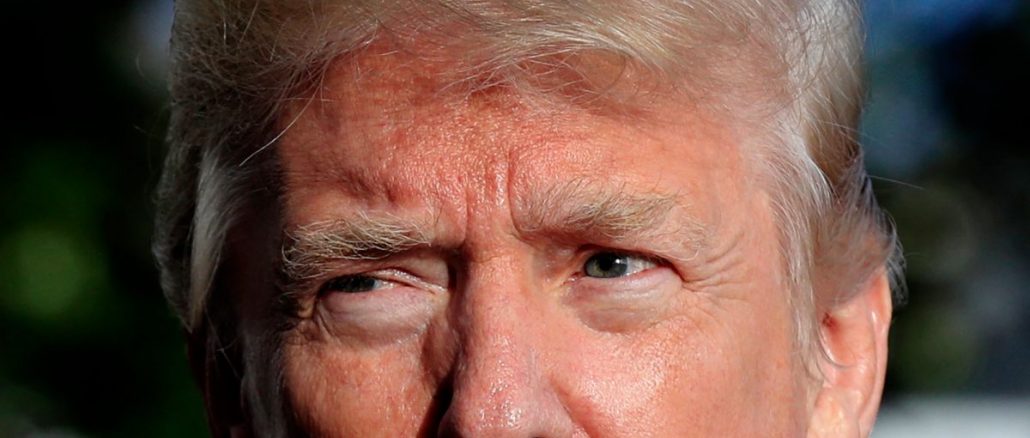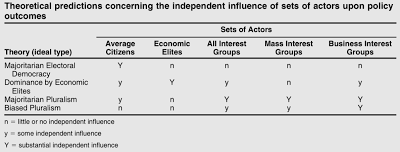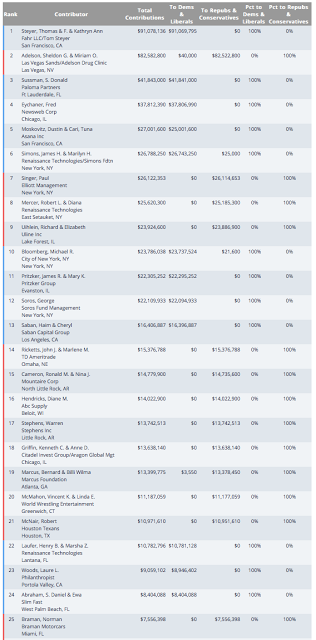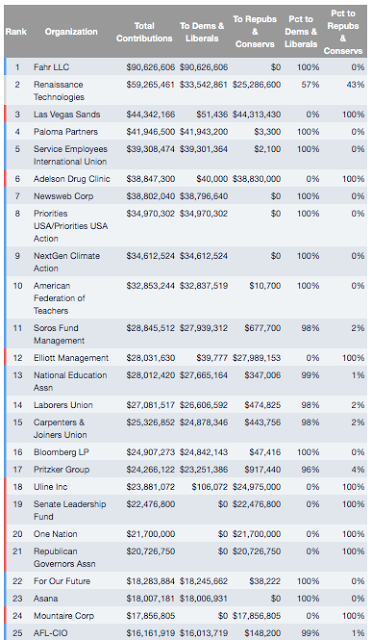
A paper by Martin Gilens and Benjamin Page entitled “Testing Theories of American Politics: Elites, Interest Groups and Average Citizens” provides us with an interesting analysis of who is really in control of American public policy, an issue that many of us already suspect is controlled by a small group of Americans.
There are four theoretical traditions in the study of American politics, each with a different set of actors who form a critical role in determining government policies:
1.) Majoritarian Electoral Democracy: this tradition attributes government policies to the collective will of its citizens who are empowered through the mechanism of democratic elections. This can also be viewed as the “electoral reward and punishment” version of democracy where voters judge the results of government policies and how well these policies have satisfied their interests and values.
2.) Economic-Elite Domination: this tradition attributes government policies to the will of individuals who have substantial economic resources, for example, high levels of wealth or income or social status including positions within political parties, managerial and executive roles in corporations, top-level positions in the executive, legislative and judicial branches of government and high military rank. For the purposes of this study, the authors focus on the importance of economic elites.
3.) Majoritarian Pluralism: this tradition attributes government policies to the will of a majority of the population with the majority being categorized by religion, language, social class or other intensifying factor. In the majoritarian tradition, mass participation and majority rule are required for democracy to function.
4.) Biased Pluralism: this tradition attributes government policies to and unrepresentative universe of interest groups, particularly from the business sector. In this tradition, policy outcomes tend to tilt toward the wishes of corporations, businesses and professional organizations.
As such, here is a table showing the theoretical predictions concerning the influence of each set of groups on government policies:
We should keep in mind that we find the following:
1.) in some cases, the wealthy among us want the same thing from government policies as the poorest among us.
2.) U.S. membership organizations, particularly labour unions and organizations like the American Association of Retired Persons, favour the same policies as average citizens.
3.) some U.S. membership organizations take stands on key issues that represent only a fraction of average citizens – for example, pro-life and pro-choice groups, pro-gun and pro-gun control groups.
4.) the authors found that wealthy Americans do not always share the same policy preferences as business-oriented groups.
To test which of the four theoretical traditions are most applicable to American politics, the authors assembled a database which looked at the influence of public policy on affluent, poor and middle income Americans. They assembled a database which consisted of 1,923 instances between 1981 and 2002 in which a national survey of the American public asked a for/against question about a proposed change in government policy which did not involve a Constitutional amendment or Supreme Court ruling. In 1,779 of these original cases, income breakdowns were provided by the respondents and, thus, were usable by the authors for their analysis.
Here are the author’s conclusions:
1.) a proposed policy change with low support among economically-elite Americans (20 percent support) is adopted only 18 percent of the time.
2.) a proposed policy change with high support among economically-elite Americans (80 percent support) is adopted 45 percent of the time.
3.) a proposed policy change with high support among both groups (as defined above) is adopted about 56 percent of the time.
4.) narrow pro-change public majority cases got the policy changes that they wanted about 30 percent of the time.
5.) wide pro-change public majority cases (80 percent public approval) got the policy changes that they wanted about 43 percent of the time.
6.) ordinary citizens do not always lose out; when the policies that they favour happened to line up with those of the economic elites, there is a far greater change of the policies being adopted.
The authors concluded that, from their dataset, it appears that the traditionally held view of the Majoritarian Electoral Democracy appears to be a complete failure; when the preferences of organized groups and economic elites are controlled for in government proposed policy changes:
“…the preferences of the average American appear to have only a minuscule, near-zero, statistically non-significant impact upon public policy.”
The authors also note that organized and special interest groups, as a whole, do not substitute for the will of the voting public.
Here are the authors’s conclusions:
“What do our findings say about democracy in America? They certainly constitute troubling news for advocates of “populistic” democracy, who want governments to respond primarily or exclusively to the policy preferences of their citizens. In the United States, our findings indicate that they majority does not rule – at least not in the causal sense of actually determining policy outcomes. When a majority of citizens disagrees with economic elites or with organized interests, they generally lose. Moreover, because of the strong status quo bias built into the U.S. political system, even when fairly large majorities of Americans favour policy change, they generally do not get it…
Americans do enjoy many features central to democratic governance, such as regular elections, freedom of speech and association, and a widespread (if still contested) franchise. But, we believe that is policymaking is dominated by powerful business organizations and a small number of affluent Americans, then America’s claims to be a democratic society are seriously threatened.” (my bold)
Let’s close with this graphic from Open Secrets which shows the list of the top 25 individual donors from the 2016 election cycle:
Here is a list of the top 25 organizational contributors:
Can we say plutocracy? Perhaps, despite what Washington may think, the American style of democracy really isn’t what other nations should be aspiring to attain nor is it the type of democracy that the United States should force upon other nations.
Click HERE to view more.
You can publish this article on your website as long as you provide a link back to this page.




Be the first to comment